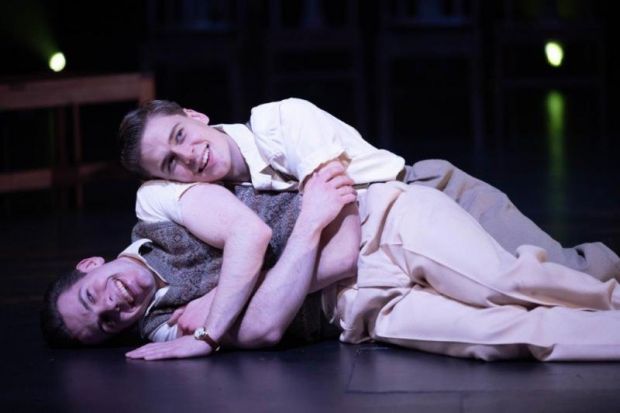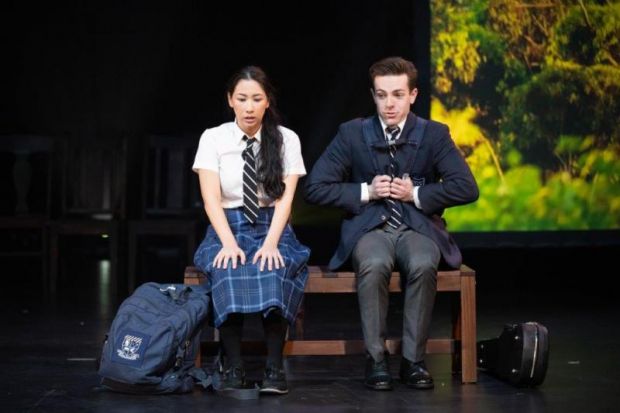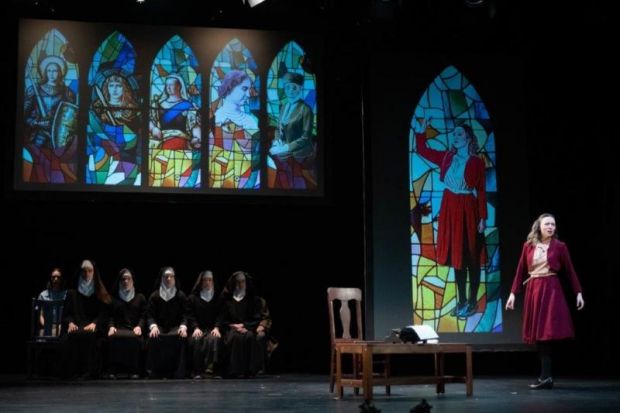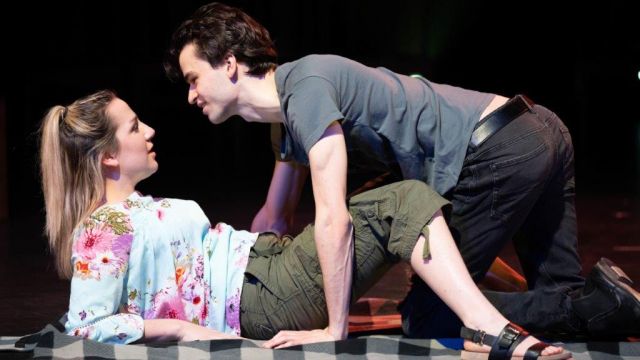Coming of Age in Australia: An Anthology of Australian Theatre
Australian playwrights have provided leading voices in the development of Australia’s cultural
identity, and this year Flinders University Drama Centre’s nine graduating actors have, under the direction of renowned Australian Director, Wayne Harrison AM, examined the impact of these works with an anthology performance of landmark coming-of-age stories in Australian theatre in a purpose written piece called Coming of Age in Australia.
Challenging themselves with roles in 10, often seminal works, this tight ensemble of actors delivered performances that authentically celebrate, driven by their individual dreams and passions, that they are on the brink of careers as professional actors, writers, film makers and directors. Treating the actors as skilled professionals, no detail has escaped the top notch assembled Production Team and the result was a night of top notch, absorbing theatre.

Harrison has cleverly woven together scenes from revered historical pieces including Ray Lawler’s Kid Stakes and Summer of the 17th Doll, Peter Kenna’s Hard God, Dorothy Hewett’s The Chapel Perilous and, from Australia’s most prolific playwright David Williamson’s Brilliant Lies. Using these pieces as the springboard for our growing wisdom as a nation, the actors journeyed from the 1930’s to the 1990’s tackling the loss of innocence and sexual identity, the struggles of class and gender roles and the quest for Australians to relish who we were, and have thus become.
Bringing the lens up to date, other witty, topical, contemporary and poignant pieces such as Bugged by Vivian Nguyen, Louis Nowra’s Summer of the Aliens, Michael Gow’s Away, Debra Oswald’s The Peach Season and Janis Balodis’ Too Young for Ghosts (written in 1985 and set in 1948, and widely regarded as one of our first plays to tackle post war immigration), complete the collection of stories. Each actor selected a piece of choice to be part of the ensemble performance, and each of them has a significant role in their vignette.

The staging is skilful, almost impeccable, at all times adding to the story telling. Tom Kitney, an awarded Lighting Designer lit and provided sound and videography for every piece, enhancing the story, the era and actor impact. A ‘hero’ is the use of three screens that artfully create scenery and context using photographs, and the recurring use of colourful sketches, words, frames and letters.
Nationally recognised Design Supervisor, Kathryn Sproul has spared no detail, using carefully chosen period and story appropriate costumes and props. Consequently, eras and stories melt and morph seamlessly, often with actors adding or removing a simple feature as they move into place for the next piece.

The diversity and balance in the skills and strengths of these young actors is impressive, with Rhys Griffin and James Starbuck standing out as actors who created convincing young men facing losing innocence whilst also created Lawler’s Roo and Barney, acting against type, but making cane cutters both lovable and starkly vulnerable. As Jack and Joe in A Hard God, they rolled around like puppies at play, moving effortlessly and economically from romping into devastating pathos. Both are actors to watch.

Mili Damjanovic moves well. Notably, her Dulcie was a highlight where, replete in an angel costume, she was languidly swinging, carelessly hanging, and simultaneously creating warmth and audience connection with her revved up, unhinged character. Zoe Jane Mills understands both strength and vulnerability. As Sheena in The Peach Season, she was strong and protective, and as Nancy in Kid Stakes she was fun, naughty and brutally aware of who, and what she was. In Away, as Gwen, she could have written the textbook on 1960’s motherhood.

Versatility was a hallmark of Chrissy Miller’s characters. She effortlessly moved between Lawler’s irascible Emma, to Williamson’s hard bitten Katy and Hewett’s repressed, sexually confused Judith. She has stage presence and stillness that is enticing to watch. Elvy-Lee Quici captured a distressed and vulnerable teenager with ease and passion, and her middle aged painter/narrator in The Peach Season introduced lovely humour and lightness to the role and complex story.
Ella Le Fourner opened and closed the anthology as conflicted, confused Sally, the female artist whose quest for freedom and self-realisation relentlessly challenged her. Le Fourner is a skilled ensemble player who is supremely comfortable inhabiting the stage. Her Olive was poignant, while Marion, the mediator slipped from controlling to helpless, exposing a vulnerable underbelly. Jack Calver in both Away and The Peach Season carved a strong image of youthful energy and extreme vulnerability. His pacing and conveying of conflict, and childlike innocence was powerful and drew the audience’s sympathy and compassion even when his actions bordered on abhorrent.

Dion Lopresto is a skilled ensemble performer. He wears a ‘cloak’ that allows him to portray ‘everyman’ not as just ‘any man’. It will set him in great stead for the future.
In a production with so many distinguishing moments, my only small directorial query was regarding the decision to abandon what would have been Latvian accents, and the logical rhythm entailed in Too Young For Ghosts. It seemed incongruous to use Australian accents for characters in Latvia who subsequently struggled with Australia and ‘Australianisms’. Having heard fabulous use of different cadence in other pieces, it seems likely that the graduates would have embraced accents with ease.

Flinders Drama Centre and the 2022 graduating class have shown us how to come of age with skill, style and to an international standard. I, for one, cannot wait to see what these nine excellent artists do next.
Jude Hines
Subscribe to our E-Newsletter, buy our latest print edition or find a Performing Arts book at Book Nook.

